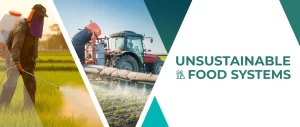 Our connection with food had a huge impact on climate change. If we increase the rate of consuming beef there will be increase in the carbon emission which indirectly affect the climate change. Our connection with nature holds the answer, and if we can eat in a way that works for our planet as well as our bodies, the natural balance of the planet’s resources will be restored,” said Richard Horton, editor-in-chief at The Lancet. “The very nature that is disappearing holds the key to human and planetary survival.The three “highs” of unhealthy eating are high calorie intake, highly processed meals, and high animal product intake. The ‘3-highs’ not only have a bad effect on human health, but they are also not environmentally sustainable. Foods made from animals require more resources than meals made from plants. Dairy and red meat, particularly beef, have higher greenhouse gas emissions.
Our connection with food had a huge impact on climate change. If we increase the rate of consuming beef there will be increase in the carbon emission which indirectly affect the climate change. Our connection with nature holds the answer, and if we can eat in a way that works for our planet as well as our bodies, the natural balance of the planet’s resources will be restored,” said Richard Horton, editor-in-chief at The Lancet. “The very nature that is disappearing holds the key to human and planetary survival.The three “highs” of unhealthy eating are high calorie intake, highly processed meals, and high animal product intake. The ‘3-highs’ not only have a bad effect on human health, but they are also not environmentally sustainable. Foods made from animals require more resources than meals made from plants. Dairy and red meat, particularly beef, have higher greenhouse gas emissions.
Global Food system is unsustainable adversely impacting our environment
The really good thing is that, not for every food item but many, foods that are healthier and more nutritious tend to be more environmentally sustainable, so it ends up being a win-win,” says Michael Clark, a food systems researcher at the University of Oxford not involved in the study.The global demand for beef, for example, has increased the demand for soy protein to feed cattle, and in response to that demand, vast swaths of the Amazon are deforested every year to make space for new soy farms and cattle, hastening the loss of carbon-absorbing and biodiverse forest. This thing shows how cruel we are. Just for the sake of having a tasty meal, we make our earth suffer. Comparatively, if we opt for healthy food, leafy green vegetables can act as acts of kindness to our mother land. Aren’t we supposed to be very kind to our homeland?
The GHGs most closely related to the production of pigs are methane and nitrous oxide. Methane has a 21 times greater influence on global warming than carbon dioxide, pound for pound. The amount of nitrous oxide is 310 times that of carbon dioxide. Seafood contamination can have a big impact on global warming. Open-ocean fishing fleets produce an estimated 130 million tons of CO2 annually because they only rely on dirty fossil fuels.1 Bluefin tuna and imported swordfish are two highly sought-after large fish species that are more likely to be overfished, leading to increased sea transit and increased global warming pollution. Additionally, the mercury content of these fish is high, which poses a risk to human health. We can live without meat and fish, but we can’t without earth and oxygen. Our choices are more inclined toward self-interest.
Given that the current global food systems are unsustainable, it is essential that we reconsider what we consume and how we produce food, working diligently and wisely to find workable solutions. Driving factors for climate change, biodiversity loss, pollution, and significant changes in land and water use may all be “managed” with the food on our plates, ensuring that food production systems do not push our ecosystem beyond safe boundaries.
